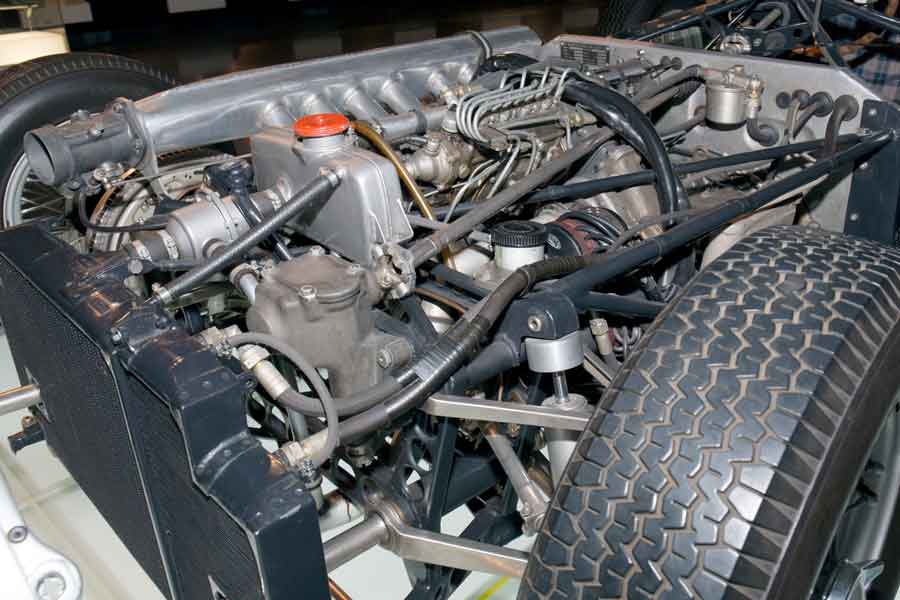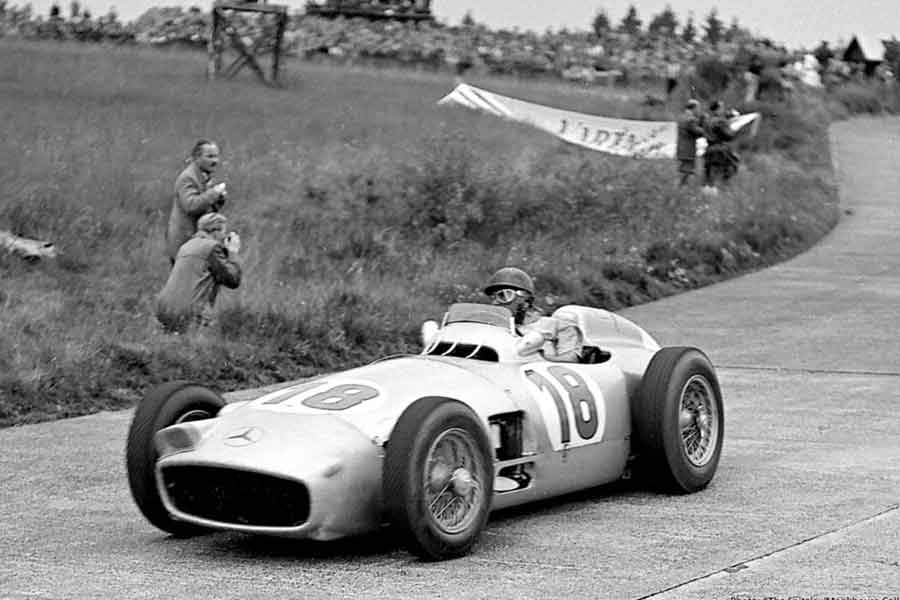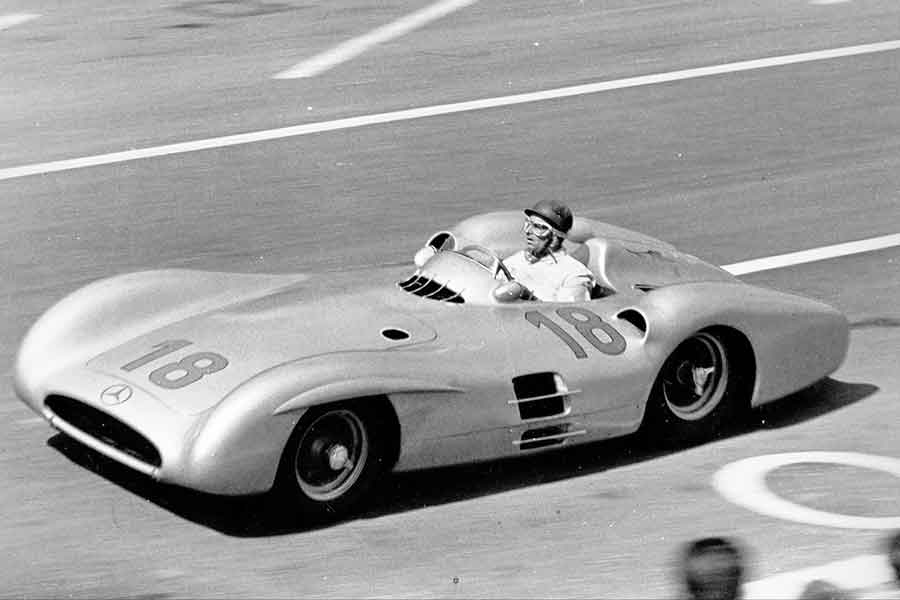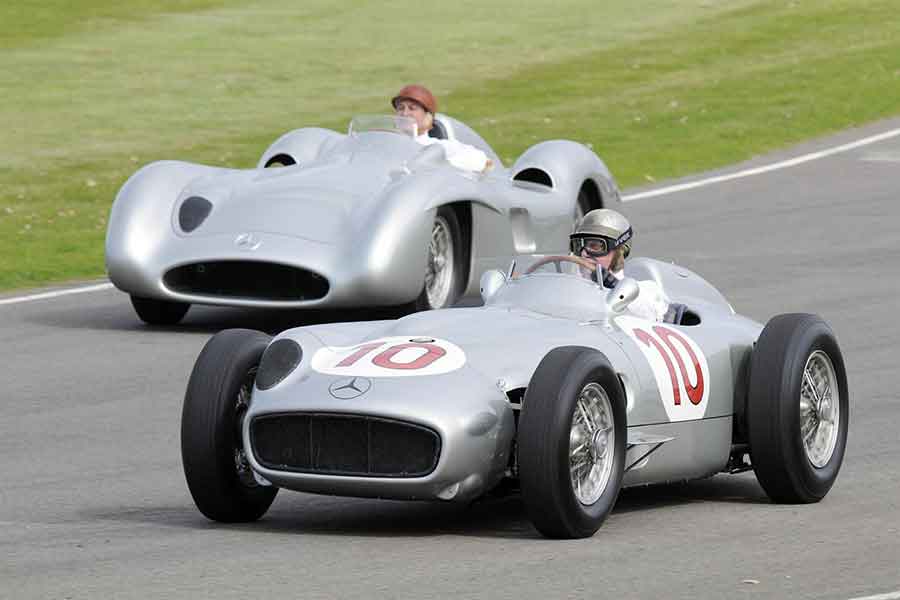Mercedes-Benz W196 - The Silver Masterpiece
In the hands of Juan Manuel Fangio, the Mercedes-Benz W196 was the car that ruled the world of Formula 1 in 1954 and 1955.
Two versions of Mercedes-Benz W196 were created
The Mercedes-Benz W196 was the car designed by Rudolf Uhlenhaut, an engineer who worked with Mercedes since 1930s, while Fritz Nailinger was in charge of the whole project. He designed two versions of this race car. The first one was streamlined, for the faster tracks, while later Mercedes introduced a version with exposed wheels, for the technically more demanding circuits.

Setting up for the race
Many new elements and technologies were used and this car was probably a step beyond its rivals. After 20 years Mercedes returned to Grand Prix racing and showed what is capable of. The German manufacturer used the fact that the 1954 season was the first year of new 2.5 liter Formula 1 regulations which meant that all manufacturers had to start with blank sheets.
The engine was different from the rest of the grid
The main strength of Mercedes-Benz W196 was the engine which was conventional on the first look. However, the valvetrain used a desmodromic system which uses the camshaft to open and closes the valves which meant that the engine could rev considerably higher. Other advantages of that concept were greater power and higher safety.

Mercedes-Benz W196 engine
Another novelty was Bosch direct fuel injection system, already used on the sports cars. The fuel use was quite interesting and driver Hans Hermann once said that the mixture of benzene, methanol, petrol, acetone and nitrobenzene would have eaten away a tank made of unprotected steel overnight.
Perfect car needed a perfect driver
Mercedes, who missed the three opening races of the season, wanted the first-class driver and logical choice was Juan Manuel Fangio, the Formula 1 champion from 1951 who began that campaign driving for Maserati. The Argentinian star was able to pull out the maximum from the Mercedes W196 and won his second title. He debuted with Mercedes in the French Grand Prix and won that race. That was followed by the victories in Germany, Switzerland, and Italy, and the 3rd place in Spain.

Juan Manuel Fangio in Mercedes-Benz W196
Other Mercedes’ drivers also did well in 1954 F1 championship. Karl Kling finished 2nd in the French Grand Prix, while Hans Herrmann was 3rd in the Swiss Grand Prix.
In 1955 Fangio won his second title with Mercedes-Benz W196
Fangio defended his crown next year. The Mercedes-Benz W196 again was dominant and Argentinian driver scored four wins – in Argentina, Belgium, Netherlands, and Italy, while in the British Grand Prix he was 2nd. Stirling Moss added another victory in 1955 at Aintree Circuit, while Kling and Piero Taruffi scored the podium finishes.

Mercedes-Benz W196 Streamliner
Interestingly, Mercedes withdrew from competitive racing that year after a big crash, the biggest tragedy in the history of motorsport, at World Sportscar Championship race Le Mans and did not return for another three decades. With 9 wins out of 12 Grand Prix starts Mercedes-Benz and its W196, whose many technical innovations over the years were adopted by the competition, went into history as one of the finest cars in the early years of Formula 1.
One of the Mercedes-Benz W196 was sold for a record price
In the Goodwood Festival of Speed Sale in 2013, Mercedes-Benz W196 chassis serial ‘00006/54’ was sold at the auction at the price of 19.6 million pounds which was a record fee of the time. That car, used by Fangio in 1954 at Nurburgring and at Bremgarten circuit, was the only example of the model in the private hands – all its surviving sisters are in the hands of a manufacturer or institutional Museum.

Mercedes-Benz W196 broke an all-time auction record
Mercedes-Benz W196 technical specifications
| Body | Aluminium body panels |
| Chassis | Steel tubular spaceframe |
| Length | 4.025 mm |
| Width | 1.625 mm |
| Height | 1.040 mm |
| Weight | 835 kg |
| Wheelbase | 2.350 mm |
| Track (front & rear) | 1.330 mm/1.358 mm |
| Front suspension | Double wishbones, torsion bars, telescopic shock absorbers |
| Rear suspension | Swing axle, longitudinal torsion bars, telescopic shock absorbers |
| Engine | M196 R, Straight 8, longitudinally mounted V8 37°, 2.496 cc |
| Power | 290 bhp / 216 kW at 8.500 rpm |
| Gearbox | 5-speed manual |
| Brakes | Light alloy drums all-round |
| Top speed | 300 km/h |
Photo: conceptcarz.com, performancedrive.com.au, sportscardigest.com




